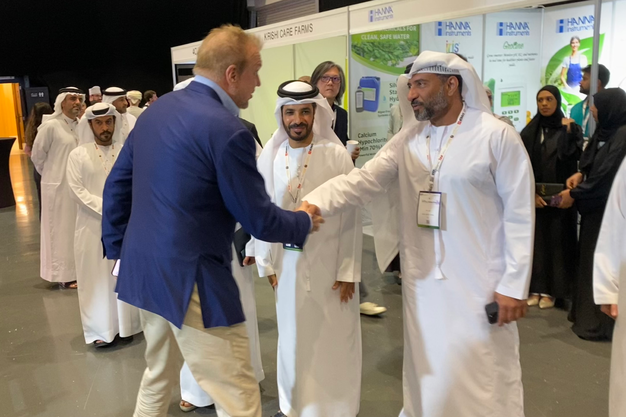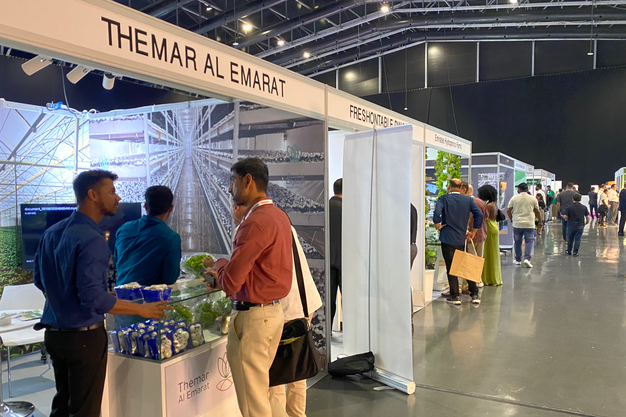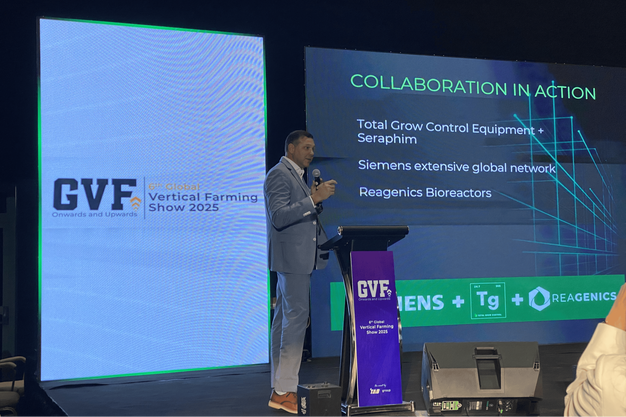The Global Vertical Farming Show concluded today in Dubai, after two days of bringing together policymakers, investors, technology providers, and growers to explore how vertical farming can scale in the Middle East and beyond. Discussions centered on capital, partnerships, and the role of vertical farming and controlled environment agriculture in regional food resilience.
The opening session set the tone with remarks from Tahir A. Bari, CEO and Managing Director of TAB Group, followed by His Excellency Dr. Mohammed Al Hammadi, Assistant Undersecretary for the Food Diversity Sector at the UAE Ministry of Climate Change and Environment. The inaugural session, Advancements in Agriculture: Stepping Towards Achieving Food Security in the Middle East, highlighted the government's commitment to diversifying the food supply. © Wesley Francis | FreshPlaza.com
© Wesley Francis | FreshPlaza.com
Exhibition floor energy
Across both days, the exhibition floor buzzed with discussions between growers, suppliers, and investors. Companies such as IEMA, Enjazponic, Wallfarm, and Körber drew steady attention, presenting technologies ranging from harvesting robots and small-footprint fertigation controllers to integrated automation platforms.
For many attendees, the chance to see practical systems and products in action was as valuable as the panel debates, with crowded booths and demonstrations creating a trade-show feel alongside the formal program. © Wesley Francis | FreshPlaza.com
© Wesley Francis | FreshPlaza.com
Scaling and profitability dominate the debate
While the exhibition floor was about possibilities, the panels were about realities. On Day 1, a notable moment in the panel discussions touched on the recent string of bankruptcies in the sector. Sky Kurtz, CEO of Pure Harvest Smart Farms, was frank: "Scaling broken things ends badly. We've seen that. Billions of capital wiped out."
Tisha Livingston, Co-Founder of 80 Acres Farms, underscored financial discipline: "We're not going to build a farm unless we know we have the money and that we'll be able to sell the products." She added, "The biggest challenge that we've had as 80 Acres, and we continue to have, is how do you build the infrastructure to support the sales and the number of sites without losing the essence of who you are."
Tom Stenzel, Executive Director of CEA Alliance, put it simply: "Companies need to understand two major things. Their cost structure, and who's going to buy the product." © Wesley Francis | FreshPlaza.com
© Wesley Francis | FreshPlaza.com
Capital, collaboration, and cultural intelligence
The second day shifted the spotlight toward investment strategies, public–private partnerships, and long-term food resilience. Panels featured regional investors, government representatives, and technology providers, all asking how vertical farming can move beyond pilot projects into sustainable business models.
Derek Oxford, CEO of Total Grow Control, underlined the importance of collective effort: "We will succeed together. Leverage relationships in new markets so that you're not starting from scratch." His remarks captured the collaborative tone that carried through the day, with speakers emphasizing alliances across finance, utilities, and supply chains. © Wesley Francis | FreshPlaza.com
© Wesley Francis | FreshPlaza.com
That message was echoed in a keynote from Ra'ed M. Ben Shams, Advisor at the Ministry of Cabinet Affairs of Bahrain, who broadened the discussion to governance and sovereignty, "Food security asks the question, do we have enough? Food sovereignty asks, do we control our destiny?"
The key takeaway was that the next phase of vertical farming in the Gulf will depend on profitability, consistent operations, and partnerships that deliver real food security for the region. As Ben Shams cautioned, "When we pursue food sovereignty, we are not just changing agricultural methods. We are asking communities to reimagine their relationships with land, tradition, and future security. Without cultural intelligence, the most brilliant vertical farming technologies become expensive decoration."
Keep an eye out for the Global Vertical Farming Show photo report.
For more information:
Global Vertical Farming Show 
[email protected]
www.verticalfarmingshow.com
